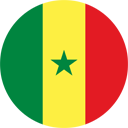Step 7 : Adjectives in Mandinka
Adjectives are used to describe nouns. To get started, we suggest you learn the three Mandinka adjectives wara, dōyā and kotō (big, small, old). Using the nouns kitābō, sīraŋo and tawundaŋo (book, chair, door) which you learned in Step 3, learn to use each adjective with each noun (the big book, the old chair, the small door). You can scroll to the top of this page to see a short lesson about Mandinka adjectives including useful examples. After you've learned to use the adjectives wara, dōyā and kotō with the nouns kitābō, sīraŋo and tawundaŋo you can move on to Step 8 (Mandinka Verbs).






